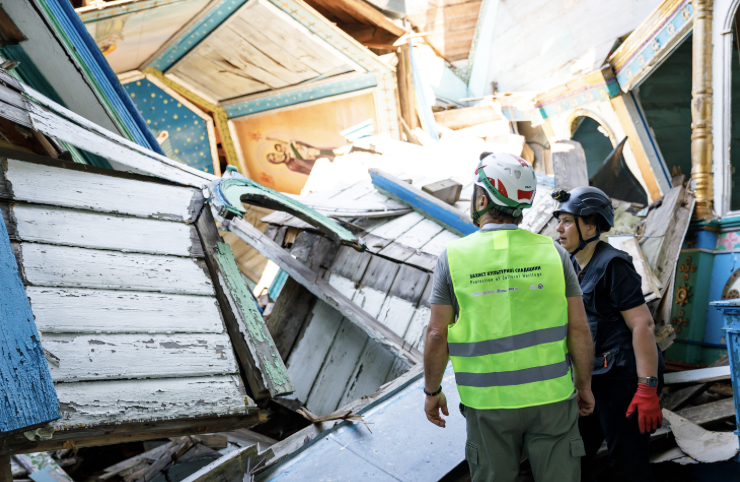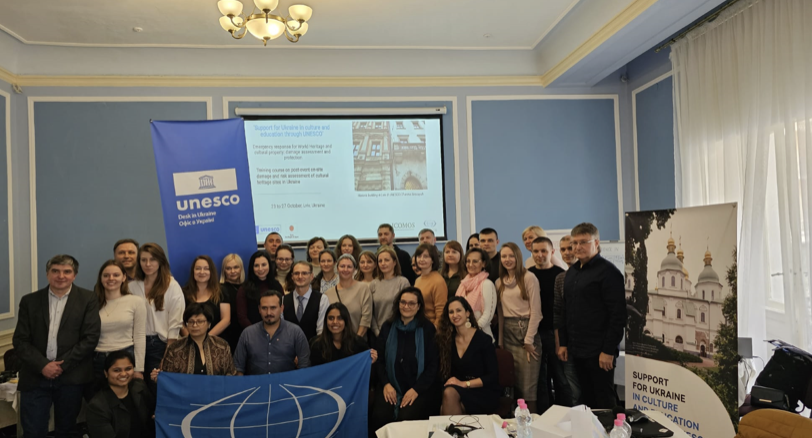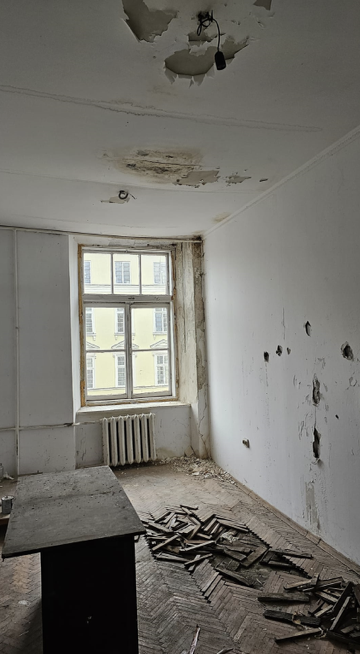The last nearly two years of the war in Ukraine have devastated the country’s cultural heritage. To address this crisis, ICCROM's flagship programme, First Aid and Resilience for Cultural Heritage in Times of Crisis (FAR), has closely collaborated with the Ministry of Culture and Information Policy of Ukraine (MoCIP) and its network to develop a strategy for building local capacities and restoring Ukraine's heritage. The support of the European Commission Directorate-General on Education, Youth, Sport and Culture (DG EAC) will play a crucial role in training the first national team of cultural first aiders.
As of 2 November 2023, UNESCO has verified the damage or destruction of an alarming total of 327 cultural heritage sites in Ukraine, while the Ministry of Culture and Information Policy in Ukraine provides even more staggering figures, reporting 825 sites affected.
 In-person training in Ukraine, August 2023.
In-person training in Ukraine, August 2023. Five-day in-person training workshop in L’Viv, Ukraine, October 2023.
Five-day in-person training workshop in L’Viv, Ukraine, October 2023.- In February and March 2022, vital resources within the FAR programme, such as the "Endangered Heritage," were translated into Ukrainian. This translation has provided a valuable tool for evacuating precious artefacts. UNESCO and Cultural Emergency Response (CER) played a supportive role in these translation efforts. In addition, the translation of "First Aid to Cultural Heritage in Times of Crisis Handbook and Toolkit into Ukrainian is underway.
- In April 2022, ICCROM-FAR, the Ministry of Culture and Information Policy (MoCIP) of Ukraine, the Maidan Museum and Heritage Emergency Response Initiative (HERI) organized an online workshop to develop a collaborative damage and risk assessment methodology for heritage sites. Outcomes included the creation of context-specific assessment forms for both movable and immovable heritage, which have since been updated in a recent MoCIP UNESCO-ICCROM workshop, details of which can be found below.
- The ICCROM Council, in a resolution adopted on 4 May 2022, expressed deep concern for the impact of the ongoing armed conflict in Ukraine on both its people and cultural heritage. The Council also recognized ICCROM's commitment to providing capacity-building activities and working in collaboration with partner organizations, such as UNESCO, to address the repercussions of the conflict on cultural heritage and called for an immediate cessation of the armed conflict in Ukraine.
- From March to June 2022, the ICCROM-FAR app was developed in order to facilitate data collection on damage and risk assessment and automate the process.
- ICOMOS and ICCROM conducted a joint mission in July 2022 to better understand the emerging needs for protecting Ukrainian cultural heritage and field-testing the ICCROM FAR app. The ICCROM-FAR app, an open-source web- and mobile-based tool for post-emergency damage and risk data collection, has since been deployed in other countries.
- In September 2022, the project began phase one of our four-phase strategy to develop capacities for crisis response and recovery of heritage in Ukraine. This strategy was developed by the FAR team based on findings from our investigative mission.
- In February 2023, ICCROM-FAR published a damage and risk assessment report to promote risk-informed cultural heritage first aid actions in Ukraine, an integral tool for efficient emergency response. This report details damage and risk assessments performed at four cultural heritage sites in Ukraine by on-the-ground teams trained by ICCROM-FAR in collaboration with the MoCIP, Maidan Museum and HERI.
- ICCROM received a grant from the US Department of State Ambassadors Fund for Cultural Preservation (AFCP) in March 2023, initiating an ongoing follow-up phase with participants receiving seed grants. The project will systematically gather damage and risk data in the first phase and build a multi-hazard risk map to inform effective risk management of heritage sites.
- In July 2023, in collaboration with MoCIP, UNESCO and ICOMOS, ICCROM-FAR trained 25 heritage professionals from eight at-risk regions across Ukraine on emergency preparedness, risk reduction and first aid to cultural heritage.
- In partnership with MoCIP, the AFCP and the Maidan Museum, ICCROM-FAR held a successful in-person immersive training in Kyiv in August 2023. This training developed capacities for risk mitigation and emergency preparedness and response at World Heritage and other significant sites in Ukraine and was generously supported by the AFCP.
- MoCIP, UNESCO and ICCROM-FAR organized a two-day online methodology unification workshop in October 2023 to streamline damage and risk assessment methods, moving toward the consolidation of forms and tools for assessing damages to affected heritage in Ukraine.
- Later in October 2023, this unified form was tested by government authorities and participants during a five-day, in-person training workshop in Lviv, Ukraine, under the banner of UNESCO, titled 'Emergency Response for World Heritage and Cultural Property: Damage Assessment and Protection.' Participants actively refined and unified various assessment forms and gained proficiency in using the ICCROM-FAR mobile and web-based application.
 Five-day in-person training workshop in L’Viv, Ukraine, October 2023.
Five-day in-person training workshop in L’Viv, Ukraine, October 2023.What's Next for FAR?
ICCROM-FAR is embarking on a 12-month project to enhance capacities in Ukraine for cultural heritage first aid and recovery planning. This initiative will involve a carefully chosen group of 20 to 25 mid-career professionals, including individuals from the newly established unit within the Ukrainian National Army to safeguard cultural heritage and experts from the State Emergency Service of Ukraine. The comprehensive ICCROM-FAR training will equip these professionals to become proactive cultural first aiders, proficient in assessing, documenting and stabilizing both tangible and intangible heritage alongside humanitarian assistance efforts. Special attention will be given to ensuring that the trained team attains national recognition and the support of Ukraine's Ministry of Culture and Information Policy (MoCIP). The training will also have a structured follow-up, and online sessions will ensure participants can systematically and knowledgeably apply first aid measures to at-risk heritage sites.
ICCROM-FAR is happy to announce that the European Commission Directorate-General of Education, Youth, Sport, and Culture has provided a grant of EUR 115.000. This funding will be instrumental in carrying out the crucial work of safeguarding Ukraine's cultural heritage through a team of well-trained national cultural first aiders.
